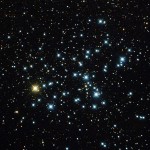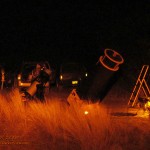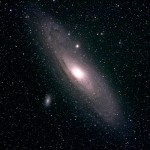Astronomy is a science where human timescales become insignificant. It seems like everything we are watching takes millions or even billions of years to occur. To be sure, there are a few things that happen quickly, like supernovae, but those events are the exceptions. Everywhere we look we see the stately dance of stars and galaxies, the formation of worlds. The dance is spread across distances and times so vast that even those who study the universe have difficulty comprehending the sheer immensity involved. Stars and planets take hundreds of thousands of years to form, a galaxy collision may go on for millions of years.

10,000 years? Pathetically inadequate!
I am going to be blunt here. This is not an case where the true answer lies somewhere betwixt two opposing views. This is a case where one of those views is simply and completely wrong. The entire realm of astronomy works on vast timescales. The suggestion that a mere 6,000 or 10,000 have passed since creation becomes completely absurd.
Astronomy is another field of science, like geology or biology, where all of the basic tenants rest upon a requirement for vast amounts of time. There is no single idea or concept that requires this, it is the entirety of all we know, every scrap of evidence. Thousand of interlocking observations, theories, our very understanding of the universe that insists on the passage of billions of years since the beginning. We certainly have a few details wrong here and there, our knowledge is ever subject to refinement, but it is clear that the history of the universe is rich with the passage of time.

It is important to remember that in astronomy distance is time is distance. Since we are seeing things by the light they emit, and that it takes time for the light to reach us, the two concepts are the same. It takes one year for light to travel one lightyear, about 5.87 trillion miles. Thus, looking out into space is also looking back in time, the further we look from Earth, the further back in time we are peering. This is true for even nearby objects. Our Sun is a mere 93 million miles away, it takes the light 8.3 minutes to cover that distance. When you look at the Sun in the sky you are seeing the Sun as it was eight minutes ago.
As a result we do not have to guess how the universe came to look as it does, we can look back in time to see how it came to be! Do you want to study galaxies at half the current age of he universe? Just get a big telescope to observe galaxies a few billion lightyears away!

It is these vast systems of billions of stars that I love. there are majestic spirals, bright cores surrounded by gracefully sweeping arms. Others exhibit oddly distorted shapes and tidal features disrupted through collisions with neighbors. In nearer galaxies I can discern softly glowing HII regions where new stars and worlds are forming. My observing notes contain observations of hundreds of galaxies using not much more than a big piece of glass and my very un-digital eyeball.
After spending hours under a dark sky looking into the immensity of space I am often deeply affected by the reality of what I am looking at. I know the numbers, I have spent years learning about our universe and how it came to be. This awareness I have come to is truly awe inspiring. I make no claim to complete understanding but I do know this… The suggestion that all of the cosmos is only a few thousand years old is completely wrong.
The assertion that all of creation is contained in a short span of time is clearly the product of a limited human mind with no true understanding of our universe. Too often those limitations come from a self imposed blindness, of faith in a traditional view invented before we learned how to see the universe for what it really is. Those old traditional worldviews are completely understandable and very human. They are also very wrong. This vast universe pays little heed to our ephemeral existence or ideas, it operates on a timescale far more grand than we can truly comprehend. But still I try.


You’re being to American in your experience, Andrew! If I search for statistics worldwide I observe than the rest of the world is much more insensitive to superstition and give more credit to science:
“In the United States, most people educated up to High School graduation or less, believe in creation in preference to evolution. In the rest of the Western world, the overwhelming majority of all people believe in the Theory of Evolution.
In 1996, the National Science Board put the question, “Believe that humans as we know them today evolved from earlier species of animals” as part of a survey of Science and Engineering Indicators for the United States. The proportions of people who replied ‘Yes’, by education level:
Graduate/professional over 70%
Baccalaureate about 60%
H.S. graduate about 41%
Less than H.S. about 29%
The Data360 organisation provides more recent statistics for the population as a whole, in the United States and selected other countries, who believe in evolution:
USA …….. 39.7%
Britain …. 73.4%
France … 79.5%
Denmark 82.2%
Summary
In the United States, most adults who completed their education in High School believe in special creation. Most Americans educated beyond High School believe in evolution, as do most adults in other Western countries.”
The US ranks near last if you consider western nations, and somewhere in the middle if you expand your scope worldwide. In this the US is again an odd exception among western nations, having a high percentage of population with strong religious affiliations, an issue that has enormous effect on US policy.
Although I agree with your position that the universe is 13.whatever-the-heck-they-say years old, I’d suggest that you’re doing a disservice to the rational (and rationalizing) capabilities of believers. It is certainly within the capability of an omnipotent God to create a universe that *appears* to be billions of years old, with light and x-rays in exactly the right frequencies and distributions to appear *as if* they had been around for etc.
And, if it’s your belief that the great challenge of the omnipotent God is to test your ability to believe these words over here over the evidence you gather outside the realm of the holy book, it even makes sense that God *would* create a universe structured that way. True, this reduces that God from an omnipresent father-figure to a trickster who, for rather petty reasons, hides in the gaps of evidence, but it is a *valid* (i.e., logically consistent) argument.
This viewpoint struck me once when I tried to point out that there must be thousands of mistranslations or, at least, nuances and shades of meaning that have altered the Bible (such as the word ‘almah’ which many insist means ‘young woman of marriageable age’ and not ‘virgin’). And the guy responded “I’m confident that a God capable of miracles is capable of maintaining the Book of his Words properly.” There’s just no arguing with a viewpoint that can invoke miracles at any time, at any scale, in any realm of discourse.
And, to a person of this viewpoint, *you and I*, with our confident recitations of facts, are the ones who are being credulous, while *they*, who have to face a daily conflict between their religious narratives and a secular narrative, are the ones who are most engaged with the quest for truth.